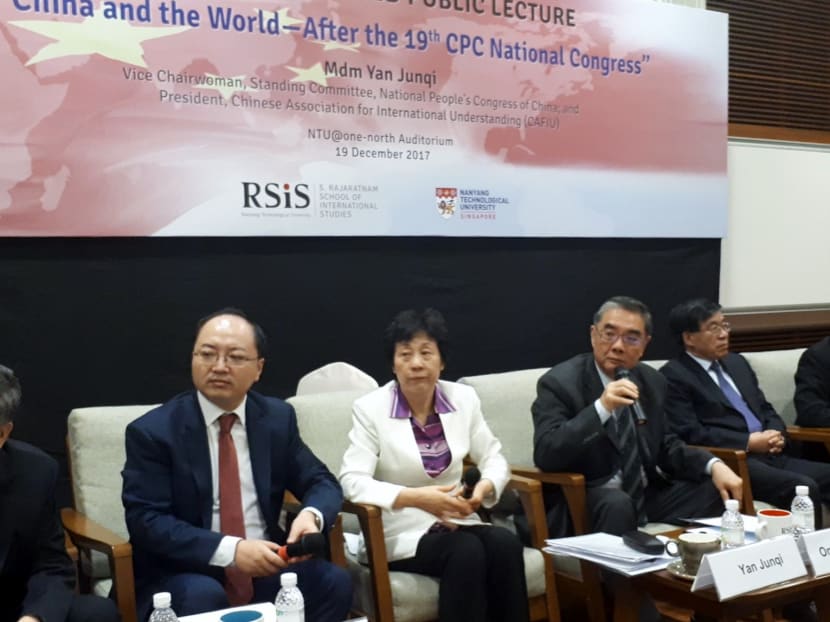China seeks peaceful rise and co-existence with others, says top official
SINGAPORE — While some may question if China will be a benign power, Beijing wants to dispel the notion that its rise will harm other countries’ interests and that it looks down on small countries, said a top Chinese official on Tuesday (Dec 19).

Singapore has been an important partner for China as it opened up through its reforms and engaged the international community, says Madam Yan Junqi, Vice Chairman of the National People’s Congress. Seen here with her at the forum are Singapore's Ambassador-At-Large Ong Keng Yong (holding microphone) and the Chinese Embassy's chargé d'affaires Fang Xinwen (in red tie). Photo: Jason Tan / TODAY
SINGAPORE — While some may question if China will be a benign power, Beijing wants to dispel the notion that its rise will harm other countries’ interests and that it looks down on small countries, said a top Chinese official on Tuesday (Dec 19).
Speaking at a public lecture, Madam Yan Junqi, Vice Chairman of the National People’s Congress, China’s legislature, acknowledged that suspicions about China’s rise may arise given the country’s large size.
But she added that there was no basis for such “prejudices”.
Instead, China wants to work with other countries to build a future global development concept for mankind, reiterating a goal outlined by President Xi Jinping at the Chinese Communist Party’s 19th Party Congress in October.
“If I do well, I also hope others do well. Only this kind of development can be stable and sustainable in the long term,” she said at the S. Rajaratnam School of International Studies (RSIS) Distinguished Public Lecture.
Madam Yan was responding to a question from Dr Termsak Chalermpalanupap, a Iseas-Yusof Ishak Institute research fellow who had asked her what she thought was the international community’s most serious misunderstanding of China.
Madam Yan noted that throughout history, the rise of big powers was through colonialism, war or the building of strategic alliances.
China has long been a developing country which has suffered under these powers throughout its history, she noted.
“Therefore, we believe that we must adhere to the path of peaceful development,” she said.
“With China being a country of such a large size, some may question if its developmental progress will impinge on other countries’ interests. Will China look down on small nations? There are such concerns,” she added.
“Well, that’s exactly why we have international exchanges, as well as today’s event – to dispel prejudice.
“Prejudice comes from a lack of understanding. And prejudice gives rise to fear. And once if you have fear, you will not be able to cooperate with each other.”
That is why China wants to share its “development theory and wisdom” for the world to understand China, she said.
“We believe that today’s world must be a diverse one in order for it to prosper and for this prosperity to be sustained over the long term.”
She noted that different cultures and civilisations “must have their own place in the world” and there should be greater tolerance of other civilisations.
“No civilisation or culture should seek to replace or see itself as superior to another,” she told an audience of about 300 diplomats, academics and corporate executives.
“Everyone should co-exist. That’s the exact message we want to convey to you today.”
Born in Shanghai, Madam Yan has been been the vice-chair of the Standing Committee of China’s legislative body for two terms since 2008. She also heads the Chinese Association for International Understanding as well as the China Association for Promoting Democracy, one of only a handful of legal political parties in China.
During her 45-minute lecture in Mandarin, she outlined the key outcomes of the party congress in October, including China’s goals to protect its environment and to pursue quality economic growth. She also touched on issues such as China’s politics and efforts in poverty alleviation during the subsequent question-and-answer session moderated by RSIS executive deputy chairman and Singapore’s Ambassador-At-Large Ong Keng Yong.
On China’s bilateral relationship with Singapore, Madam Yan noted this has grown significantly since both countries established diplomatic relations in 1990, adding that the Republic has been an important partner for Beijing as it opened up through its reforms and engaged the international community.
“Singapore is an important channel for China to expand its international exchanges and also an excellent example of how China has learned from a foreign partner,” she said.
While both governments have established cooperation mechanisms at different levels, people-to-people exchanges have also grown, with Singapore now a top destination for Chinese tourists, she said.
Noting that since 1996, over 30,000 Chinese government officials have also visited Singapore for study tours, she added: “Singapore’s natural beauty, cleaniness, as well as its advances in the financial, technological and educational have impressed many Chinese visitors.”






